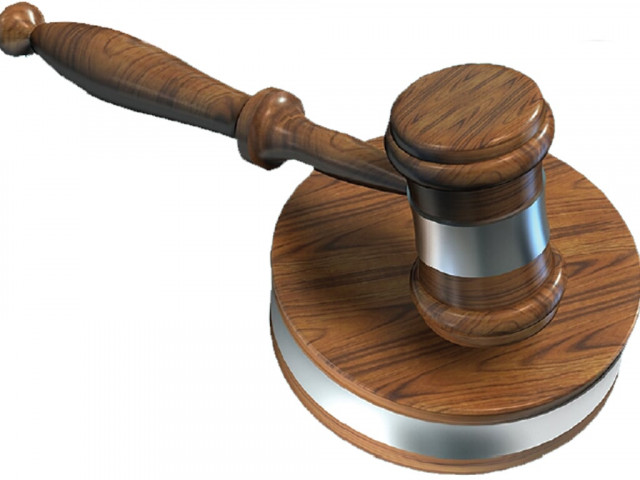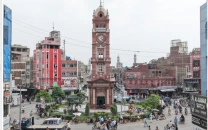Bar conference: Lawyers demand review of judicial policy
Say hasty clearing of backlog will lead to more litigation.

Lawyers’ representatives from across the country have criticised the speed at which the courts have disposed of cases pending since 2008 in recent months, calling it a violation of due process that will result in further litigation in the form of appeals.
The participants in the All Pakistan Lawyers Representatives Conference here on Thursday passed a resolution demanding the withdrawal of the judicial policy calling for the disposal of all cases pending since 2008 by the end of this year.
The policy formulated by the National Judicial Policy Making Committee (NJPMC) was unreasonable and violated the principles of due process, stated the resolution.
“The direction should be withdrawn with immediate effect,” it read. “Denial of due process will not end delays but will simply multiply litigation, clogging the courts for decades to come.”
The conference was hosted by the Pakistan Bar Council (PBC) at the Lahore High Court Bar Association’s (LHCBA) Karachi Shuhada Hall. It was attended by the elected representatives of bar councils and bar associations.
Justice hurried is justice buried
The policy “is possibly an earnest effort for streamlining the administration of justice and carried some fruitful recommendations. But it suffers from serious flaws and its implementation lacks due process as guaranteed under Article 10A of the Constitution,” the resolution read.
Rather than the delivery of justice without delay, the policy had resulted in a focus on ending litigation through any means, it said. Basic principles laid down for judicial independence had been ignored. “While eliminating delays, justice should not be buried in the process,” it read.
The lawyers noted that from July 1 to November 30, the 1,350 judges in the subordinate judiciary in the Punjab had disposed of a total of 795,673 cases. The lawyers acknowledged that there was a huge backlog and chronic delays in the courts, but said the best way to address these was through better case management and the filling of vacancies for judges.
“Every High Court should devise an independent case management and court management system for control over subordinate judges in close consultation with elected representatives of the bar,” read the resolution.

Nomination of judges
“The deficiency of judges in the High Courts is mainly responsible for the backlog of cases,” read the resolution. There are over 8,000 prisoners on death row who have appeals pending.
The Sindh High Court is meant to have 40 judges, but only has 24. The Lahore High Court has a sanctioned strength of 60 judges, but only has 36. The appointment of judges should be carried out without delay and on merit so that the High Courts can work at full strength, the lawyers said. The size of the subordinate judiciary should also be increased and the government should provide funds for the establishment of more courtrooms and other infrastructure.
The nomination of judges is now the sole responsibility of the Judicial Commission. The lawyers’ representatives said that the rules should be amended so every member of the commission could propose a name to be considered for appointment to the superior judiciary, rather than just the chief justices of the High Courts and the Supreme Court.
“The accountability structure of the judicial policy undermines the judicial autonomy of the High Court and seriously undermines their independence. It creates a single fountain head of judicial power, which compromises Article 203 of the Constitution,” the resolution read.
The lawyers suggested that retired judges of the superior courts should not be appointed to any paid post, particularly one lower in status to their previous post, barring exceptional circumstances. Similarly, practising lawyers rather than retired judge should be appointed to head tribunals and special courts.
The judicial authorities should take serious and prompt action to end widespread corrupt practices, the lawyers said. Disciplinary action against lawyers pending before disciplinary tribunals must also be decided quickly. The Supreme Judicial Council must also take up the references pending before it for several years.
The bar representatives also said that the Supreme Court should have consulted the bars concerned on the reference sent by President Asif Zardari to the Supreme Court regarding the appointment of judges to the Islamabad High Court, as the lawyers were key stakeholders in the case. The lawyers’ point of view “has been shut out in this particular matter,” they said.
PBC Vice Chairman Akhtar Hussian, PBC Executive Committee Chairman Burhan Muazzam Malik, Supreme Court Bar Association President Mian Israrul Haq, LHCBA President Shehram Sarwar Chaudhry, Punjab Bar Council Vice Chairman Ghulam Abbas Nissoana, Balochistan Bar Council Executive Committee Chairman Munir Kakar, and PBC members Mian Abbas, Ramazan Chaudhry, Ahsan Bhoon, Azam Nazir Tarar and Syed Qalb-e-Abbas participated in the conference.
Published in The Express Tribune, December 21st, 2012.






1675249047-0/image-(18)1675249047-0-208x130.webp)












COMMENTS
Comments are moderated and generally will be posted if they are on-topic and not abusive.
For more information, please see our Comments FAQ